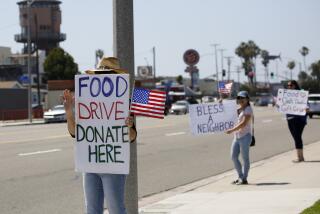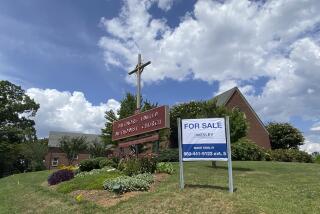Message of Brotherly Love Forgotten : Charity: A new book urges churches to help needy by encouraging the tradition of tithing 10%.
- Share via
In a joke in the new issue of the Joyful Noiseletter, a congregant told his pastor he did not have a problem giving 10% of his income to the church when he made $50 a week.
Nor did it bother him to tithe when he made $500 a week. But now that he’s making $5,000 a week, he is reluctant to give $500 a week to the church.
The pastor began to pray: “Dear God, please make this man’s weekly income $500 a week so that he can tithe.”
In this season of gift-giving, new research reveals truth behind the humor.
Per-member giving as a percentage of income among many of the major Protestant denominations reached a 23-year low in 1990, declining from 3.05% in 1968 to 2.6% in 1990, according to empty tomb inc., a research organization based in Champaign, Ill.
Although money is the second-most talked about topic in the Bible--with one in seven verses of the Gospel of Luke alone that can be interpreted as referring to material goods--the churches have fallen silent amid a decline that has forced them to concentrate on institutional survival rather than reaching out to the world’s poor, say Sylvia and John Ronsvalle of empty tomb.
“Here we are in the United States, one of the richest nations on the face of the Earth, and we refuse to discuss it,” Sylvia Ronsvalle said in an interview.
How far back the biblical mandate to care for the poor goes can be seen in part in the discovery of an 8th-Century BC bowl that may be the world’s oldest poor box.
In an article in the November-December issue of Biblical Archeology Review, Gabriel Barkay, a senior lecturer at Tel Aviv University, says three ancient Hebrew letters inscribed in the bowl in Jerusalem’s Rockefeller Museum could be understood as referring to “your brother.”
“Your brother” is a term used in biblical laws referring to social justice, Barkay said. For example, Deuteronomy 15:11 commands: “Open thy hand wide unto thy poor and needy brother.”
But the Ronsvalles, who are currently studying 60 congregations from 10 different denominations, say in America today there is only one class “and that’s the not-rich.”
Even individuals with three cars, a mansion and a housekeeper always are looking for a dollar more before they would consider themselves wealthy, Sylvia Ronsvalle said.
At some church workshops, people have gone so far as to say children dying from starvation are easing the world’s population crisis, unmindful of either the moral dimension or the fact that the poor in those conditions tend to have more children because they fear some of the children they have now will die, the Ronsvalles said.
The Ronsvalles said the concern for self is understandable in a society that has been encouraged by advertising and secular culture toward self-fulfillment through material goods.
But what disturbs them is the church’s retreat from its own message of the responsibility to care for the poor. Despite the fact that most Americans still have relatively affluent lifestyles, the anxiety created by the recession has pushed churches both large and small, rural and urban, into what the Ronsvalles call a survival mode.
Money is rarely discussed.
In their new book, “The Poor Have Faces: Loving Your Neighbor in the 21st Century,” the Ronsvalles suggest that if the tithe could once again be embraced, tens of billions of dollars could be generated to help avert tragedies such as the 15 million children who die each year from preventable diseases or conditions of poverty.
To cast their lot with the poor, the Ronsvalles moved into a public housing project in Champaign 12 years ago.
What they call for on a larger scale is for churches to challenge individuals with the biblical mandate to love their neighbors as themselves.
More to Read
Sign up for our Book Club newsletter
Get the latest news, events and more from the Los Angeles Times Book Club, and help us get L.A. reading and talking.
You may occasionally receive promotional content from the Los Angeles Times.










